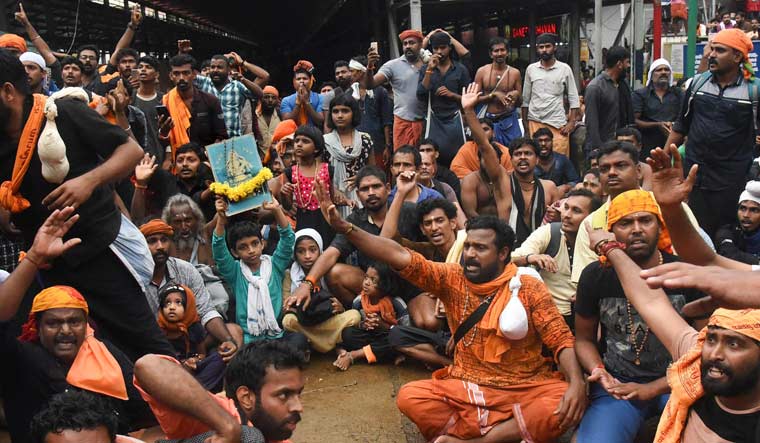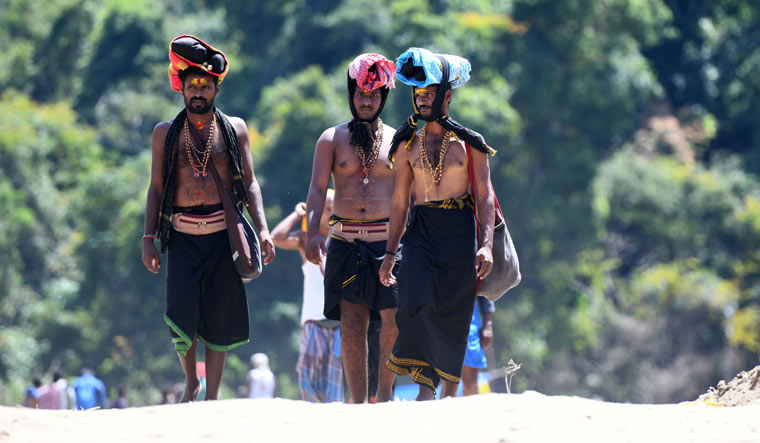The Travancore Devaswom Board, which administers the Sabarimala temple in Kerala, said on Friday that it would approach the Supreme Court with a detailed report on the prevailing situation in the state after the apex court allowed women in all age groups to enter the hill shrine.
The board's decision came after high drama unfolded at the temple after two women trekked the hill with heavy police escort, drawing massive protests from devotees and priests.
TDB president A. Padmakumar said the board would not file a review petition. Advocate Manu Abhishek Singhvi, who appeared for Kerala in the apex court, will be entrusted with the task of appraising the court of the situation prevailing in the state after the government decided to implement the order on entry of women in all age groups into the shrine. A similar report will be submitted in the High Court, too, he said.
Related stories
- ‘Devotees visit temples to see god, not faces of CM, MLAs’: Kerala HC raps Travancore Devaswom
- Sabarimala: A tale of flickering light in the woods
- 'No uncontrolled situation', says Kerala CM amid severe criticism over 'crowd mismanagement'
- Why Kerala HC barred production, sale of 'Aravana Prasadam' at Sabarimala
"TDB is for resolving the issue and there is no politics for the board...," he said.
Meanwhile, orders prohibiting assembly of more than four people, which were promulgated in the temple complex, Pamba and Nilakkal, have been extended for three days till October 22. Pathanamthitta district collector P.B. Nooh said the situation was under control.
Earlier, the hill shrine witnessed tense moments after two women—a Hyderabad-based journalist and a Kochi-based activist—climbed the hill with the escort of over 200 police personnel led by Inspector General S. Sreejith. After reaching Valiya Nadappandhal (the queue complex), nearly 500m away from the sanctum sanctorum, they were forced to return, with hundreds of devotees staging protest at the temple complex chanting Ayyappa mantras.
The tantri (head priest) also warned that he would close the temple if 'tradition' was violated, forcing the police to dissuade the women from proceeding further.
"The tantri has informed me that he will close the temple and go if the women enter the shrine complex. It was conveyed to the women and they have expressed their willingness to go back. We will give them protection in the same manner to climb down the hills," Sreejith said.
While they were returning to the Pamba base camp, another woman from Thiruvananthapuram expressed her willingness to trek the hill. However, the police persuaded her to go back saying she could not be given security.
 Protesters oppose the entry of women to the Sabarimala temple | PTI
Protesters oppose the entry of women to the Sabarimala temple | PTI
Devaswom Minister Kadakampally Surendran, who was in Thiruvanathapuram, said the government was not ready to use force and hurt the sentiments of devotees. He also said one of the women was later identified as an activist and Sabarimala was not a place to show their strength and activism.
With protests intensifying across Kerala, state police chief Loknath Behera met Governor P. Sathasivam and updated him about the situation.
"This follows the Honorable governor seeking information about the law and order situation in Sabarimala and adjoining areas in the wake of the protests against the possible entry of women into the temple," a Raj Bhavan release said.
Along with the protests, the political blame game also continued unabated with the Congress and the BJP accusing the Left government of 'hurting' the sentiments of devotees by bringing 'activists' to the temple. They also alleged the police gave one of the women, who climbed to the hill shrine amid heavy security, their official uniform and helmet. The ruling CPI(M), however, alleged that the opposition parties are trying to capitalise on the Sabarimala issue.
Meanwhile, the Union home ministry issued an advisory, asking Kerala, Tamil Nadu and Karnataka to tighten security in view of the continuing protests against the SC verdict.
On September 28, a five-judge Constitution bench of the Supreme Court, headed by then chief justice Dipak Misra, lifted the centuries-old ban on the entry of women of menstrual age into the hill shrine situated on the Western Ghats.
(With PTI inputs)


